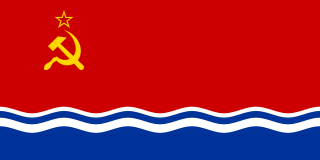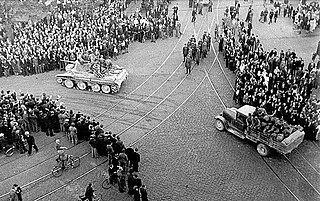Soviet occupation of Latvia can refer to:
Soviet occupation of Latvia can refer to:

The Baltic states or the Baltic countries is a geopolitical term, which currently is used to group three countries: Estonia, Latvia, and Lithuania. All three countries are members of NATO, the European Union, the Eurozone, and the OECD. The three sovereign states on the eastern coast of the Baltic Sea are sometimes referred to as the "Baltic nations", less often and in historical circumstances also as the "Baltic republics", the "Baltic lands", or simply the Baltics.

The Singing Revolution was a series of events that led to the restoration of independence of the Baltic nations of Estonia, Latvia, and Lithuania from the Soviet Union at the end of the Cold War. The term was coined by an Estonian activist and artist, Heinz Valk, in an article published a week after 10–11 June 1988, spontaneous mass evening singing demonstrations at the Tallinn Song Festival Grounds. Later, all three countries joined the EU and NATO in 2004.

The Latvian Soviet Socialist Republic, also known as Soviet Latvia or simply Latvia, was a Federated Republic within Soviet Union, and formally one of its 16 constituent Republics of the Soviet Union. The Latvian Soviet Socialist Republic was in existence for fifty-one years, from August 5, 1940 to September, 6 1991.

The Baltic states of Estonia, Latvia and Lithuania were invaded and occupied in June 1940 by the Soviet Union, under the leadership of Stalin and auspices of the Molotov-Ribbentrop Pact that had been signed between Nazi Germany and the Soviet Union in August 1939, immediately before the outbreak of World War II. The three countries were then annexed into the Soviet Union in August 1940. The United States and most other Western countries never recognised this incorporation, considering it illegal. On 22 June 1941, Nazi Germany attacked the Soviet Union and within weeks occupied the Baltic territories. In July 1941, the Third Reich incorporated the Baltic territory into its Reichskommissariat Ostland. As a result of the Red Army's Baltic Offensive of 1944, the Soviet Union recaptured most of the Baltic states and trapped the remaining German forces in the Courland pocket until their formal surrender in May 1945.

The military occupation of Latvia by Nazi Germany was completed on July 10, 1941 by Germany's armed forces. Initially, the territory of Latvia was under the military administration of Army Group North, but on 25 July 1941, Latvia was incorporated as Generalbezirk Lettland, subordinated to Reichskommissariat Ostland, an administrative subdivision of Nazi Germany. Anyone not racially acceptable or who opposed the German occupation, as well as those who had cooperated with the Soviet Union, were killed or sent to concentration camps in accordance with the Nazi Generalplan Ost.
Many Latvians resisted the occupation of Latvia by Nazi Germany. The Latvian resistance movement was divided between the pro-independence units under the Latvian Central Council and the pro-Soviet units under the Central Staff of the Partisan Movement in Moscow. Daugavpils was the scene of fierce Jewish resistance during the Holocaust. Many local Latvians were actively involved in the resistance movement against the ethnic policies of the German occupation regime. 134 Latvians were later honored with the title Righteous Among the Nations. Among them is Žanis Lipke, who risked his life to save more than 50 Jews.

Cinema of Latvia dates back to 1910 when the first short films were made. The first cinematic screening in Riga took place on May 28, 1896. By 1914 all major cities in Latvia had cinemas where newsreels, documentaries and mostly foreign-made short films were screened.

The three Baltic countries, or the Baltic states – Estonia, Latvia, and Lithuania – are held to have continued as legal entities under international law while under the Soviet occupation from 1940 to 1991, as well as during the German occupation in 1941–1944/1945. The prevailing opinion accepts the Baltic thesis of illegal occupation and the actions of the USSR are regarded as contrary to international law in general and to the bilateral treaties between the USSR and the three Baltic countries in particular.

The Soviet occupation of Latvia in 1940 refers to the military occupation of the Republic of Latvia by the Soviet Union under the provisions of the 1939 Molotov–Ribbentrop Pact with Nazi Germany and its Secret Additional Protocol signed in August 1939. The occupation took place according to the European Court of Human Rights, the Government of Latvia, the United States Department of State, and the European Union. In 1989, the USSR also condemned the 1939 secret protocol between Nazi Germany and herself that had led to the invasion and occupation of the three Baltic countries, including Latvia.
Museum of Soviet occupation may refer to:

Latvia first participated at the Olympic Games in 1924. After the nation was occupied by the Soviet Union in 1940, Latvian athletes competed for the Soviet Union at the Olympics between 1952 and 1988. After the independence of Latvia and the dissolution of the Soviet Union in 1991, the nation returned to the Olympic Games in 1992 and has competed at every Games since then.

Latvian national partisans were Latvian pro-independence partisans who waged guerrilla warfare against Soviet rule during and after the Second World War.

The Soviet re-occupation of Latvia in 1944 refers to the military occupation of Latvia by the Soviet Union in 1944. During World War II Latvia was first occupied by the Soviet Union in June 1940, then was occupied by Nazi Germany in 1941–1944, and after which it was re-occupied by the Soviet Union.

The Museum of the Occupation of Latvia is a museum and historic educational institution located in Riga, Latvia. It was established in 1993 to exhibit artifacts, archive documents, and educate the public about the 51-year period in the 20th century when Latvia was successively occupied by the USSR in 1940–1941, then by Nazi Germany in 1941–1944, and then again by the USSR in 1944–1991. Official programs for visits to Latvia of top level representatives of other countries normally include a visit to the Museum of the Occupation.

The Soviet occupation of the Baltic states covers the period from the Soviet–Baltic mutual assistance pacts in 1939, to their invasion and annexation in 1940, to the mass deportations of 1941.
Soviet Occupation Day may refer to:

The Guerrilla war in the Baltic states was an armed struggle which was waged by the Latvian, Lithuanian, and Estonian partisans, called the Forest Brothers, against the Soviet Union during the Soviet invasion and occupation of the three Baltic states both during and after World War II. Similar anti-Soviet Central and Eastern European resistance groups fought against Soviet and communist rule in Bulgaria, Poland, Romania, and western Ukraine.
Soviet-occupied Latvia may refer to: